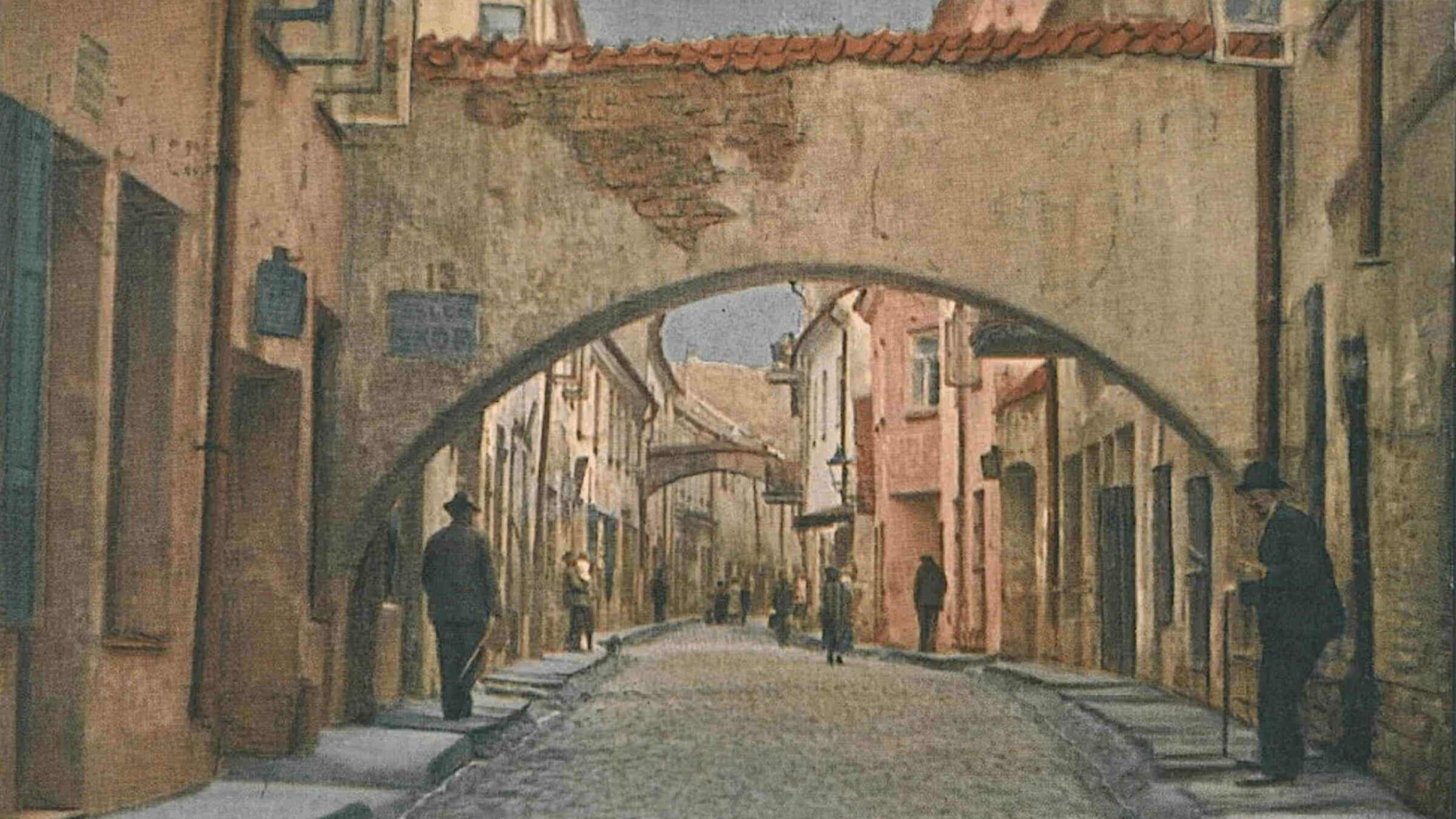Online conference to focus on Jewish life in prewar Lithuania
Among the topics discussed: How did Lithuanian Yiddish writers living abroad help spread their own dialect?

Jatkowa Street (Butchers’ Street) in the old Jewish quarter of Vilna Courtesy of the Paris Yiddish Center
In the Vilna Ghetto, amid unspeakable suffering, Jewish prisoners sang a Yiddish song called “Vilna,” expressing their deep love for the Lithuanian city that Jews had called home for at least 600 years. Even as they starved and faced deportation to extermination camps, Jews sang of “Vilna, Vilna, our home city, our longing and desire.”
And no wonder: Vilna was unique.
For centuries, it was the most renowned center of Jewish learning in the world. Its illustrious yeshivas produced many Talmudic scholars, including the revered Vilner Gaon. In fact, Vilna was nicknamed “the Jerusalem of Lithuania” because of its distinguished spiritual and intellectual life.
But secular Yiddish culture thrived there as well, especially between the two world wars. Modernist writers and avant-garde artists transformed Vilna into a major center of Yiddish culture. The city also boasted a vibrant Yiddish press, innovative Yiddish theater and some of the most renowned Yiddish publishing houses in Europe. YIVO, now based in New York City, got its start in Vilna.
On Nov. 7-10, the Paris Yiddish Center will celebrate the creativity of Jewish life in Vilna and another Lithuanian city, Kaunas (Kovne in Yiddish). The program, which will be partly in French, partly in Yiddish, will include talks, workshops, film screenings and a Shabbos meal. There’s a full description here in French.
For those who can’t make it to the conference in Paris, the following sessions will be on Zoom. Some will be in English; others in Yiddish. Register here:
Saturday, Nov. 9, 7 p.m. Paris time/1 p.m. ET: Lara Lempert, director of the Judaica Research Center at the National Library of Lithuania, will discuss the many languages used by the Jews in Vilna. Among them — Yiddish, Hebrew, Polish and Russian. She will explain how this dynamic multilingualism shaped Jewish social, intellectual and creative life in the city. (In English)
Sunday, Nov. 10, 7 p.m. Paris time/1 p.m. ET: Cinematographer and photographer Michael Shubitz will discuss his project, “Back to Kaunas” which uses historic and newly created photographs to trace the lives of 12 Holocaust survivors. Shubitz documents the Kaunas (“Kovne” in Yiddish) they knew as children, and tells the stories of their remarkable postwar lives and achievements. (In Yiddish)
There will also be a three-part literature seminar on Sunday, Nov. 10 at three separate times. Some sessions will be during the night in the U.S. Anyone who registers will receive recordings of the events afterwards. (In Yiddish)
This literature seminar will discuss writers who used litvish (Lithuanian) Yiddish, but worked in other parts of Europe or around the world. How did they help spread the litvish dialect, and how did they interact with other languages and literary traditions? Discussions will be led by Leyzer Burko, Sharon Bar-Kochva and Natalia Krynicka. (In Yiddish)
At the in-person conference in the Paris Yiddish Center, some lectures will be in French, others in Yiddish. Among the featured events on the schedule:
- A screening of The Secrets of the Great Synagogue of Vilna, a film about the magnificent synagogue at the heart of Vilna’s Jewish life for four hundred years
- A cartooning workshop exploring visual representations of Jewish life in Lithuania
- A discussion of Yiddish literary life in Kaunas between the world wars
- A reading about a journalist’s discovery of Jewish presence and absence in modern-day Vilna
- A festive Sabbath dinner (shabes tish) featuring Lithuanian Jewish and non-Jewish dishes
- A screening of the film Viena (meaning “All Alone”) about Ona Šimaitė, a university librarian who rescued Jews and Jewish books from the Vilna Ghetto
- An original Yiddish radio play about the Vilner Gaon
Visitors to the Paris Yiddish Center can also enjoy the exhibition, A Thousand Narrow Doors to the World – A Look at Yiddish Culture in Vilna, which opened on Sept. 14. Glass cases display a selection of Yiddish books published in Vilna — many with striking modernist covers and illustrations. The books are from the Paris Yiddish Center’s own extensive collections. Large explanatory posters in French line the walls around the cases.
Questions in Yiddish, French or English about the Zoom and in-person events, including how to register, can be addressed to info@yiddishweb.com. Full information in French is provided here.
A message from our CEO & publisher Rachel Fishman Feddersen
I hope you appreciated this article. Before you go, I’d like to ask you to please support the Forward’s award-winning, nonprofit journalism during this critical time.
At a time when other newsrooms are closing or cutting back, the Forward has removed its paywall and invested additional resources to report on the ground from Israel and around the U.S. on the impact of the war, rising antisemitism and polarized discourse.
Readers like you make it all possible. Support our work by becoming a Forward Member and connect with our journalism and your community.
— Rachel Fishman Feddersen, Publisher and CEO